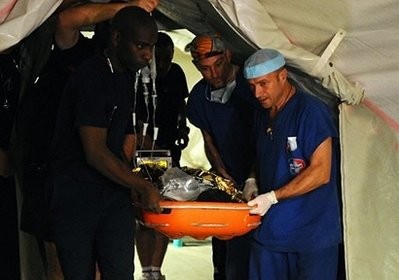Rescuers Wednesday dragged a Haitian girl alive from the rubble 15 days after a devastating quake, in a rare moment of joy for a country where victims still face a desperate shortage of aid.
A French search team saved the 16-year-old after neighbors heard a voice in the debris of a house in Port-au-Prince, ending what appeared to be the longest ordeal of any survivor so far following the January 12 disaster.
"She just said 'thank you,' she's very weak, which suggests that she's been there for 15 days," Commander Samuel Bernes of the rescue team told AFP.
"She was in a pocket surrounded by concrete. She was treated on the spot, she wasn't able to get out alone."
International rescue teams have saved around 135 people who were buried alive when the 7.0-magnitude quake laid waste to the capital and several other towns in the impoverished Caribbean nation.

The last was a 31-year-old man rescued by a US team on Tuesday, although he was thought to have been entombed by a powerful aftershock around two days after the initial tremor struck.
Haiti's President Rene Preval said "nearly 170,000" bodies had now been counted since the quake, significantly higher than previous estimates of 150,000.
"In 15 days many efforts have been made. The National Equipment Company (NEC) has made great efforts in removing nearly 170,000 dead from the streets and clearing the roadways to facilitate traffic," Preval told a press conference.
Preval suggested Haiti's legislative elections due next month would have to be postponed because of the quake.
"I don't think the time is right to hold elections now given the conditions in which people are living," Preval told AFP. "However, we must speak to the other protagonists and reach a consensus on this issue."
A massive aid effort has swung into place to help the more than one million people left homeless by the disaster, but many Haitians say they have yet to receive vital supplies of food or water.
Related article: A few gleaming offices are open in Haiti
Near the destroyed presidential palace as crowds queued under a blazing sun, Immacula Cadet said she was hungry, but was afraid of being hurt in the long lines for food aid if fighting erupts over the handouts.
"I don't want to battle in the road to have a little bread," she told AFP. "We really have problems. We need all that (aid). We need food, we have no water."
Across the city, walls have been scrawled with messages. "We need help. Food, water, medicine," said one in Spanish and English.
Related article: Upmarket Haiti pizzeria cooks up 1,000 free meals a day
Scavengers armed with small handcarts again swarmed across the rubble Wednesday removing anything salvageable, especially wood and metal to help throw up temporary shacks.
The International Monetary Fund said it was rushing 114 million dollars in emergency aid to Haiti for essential imports and to make cash available to banks and transfer houses.
Related article: Haitian voodoo heritage intact
The Haitian government has embarked on program to relocate 500,000 people in villages outside the capital but an AFP reporter said one of the main sites was a vast, gravel wasteland with just a few people hanging about hoping for work.
"We need jobs, but we are angry. The radio told us (the government) is setting up a camp, but there is nothing here," said Saint Louis Clevens, 32, outside the Croix des Bouquets site 15 kilometers (nine miles) from the capital.
US soldiers and Haitian officials insisted food aid was becoming increasingly available in some areas outside the capital as coordination improves.
"It's getting better every day," Captain Maurice Green said in the town of Tabarre 10 miles (sixteen kilometers) east of Port-au-Prince as US supplies were transferred to Haitian pick-up trucks to be moved on to smaller sites.
The United States has poured 20,000 troops into the country. The US military said it had begun to hand out 14 million meals and was aiming to supply half a million people with fresh water within a few days.
Related article: US Marine comes home to help stricken Haiti
Canada said its troops had cleared Haiti's Jacmel airfield of debris in a bid to ease the aid logjam. The main Port-au-Prince airport is under US military control, but aid is still said to be backed up there.
The UN warned meanwhile that child traffickers and gangsters could try to exploit the chaos triggered by the quake to step up their criminal activities.
























